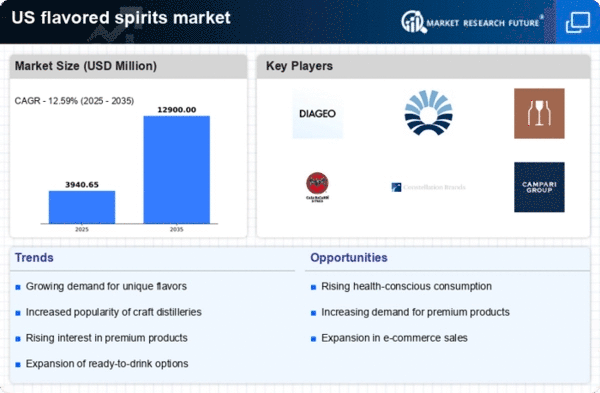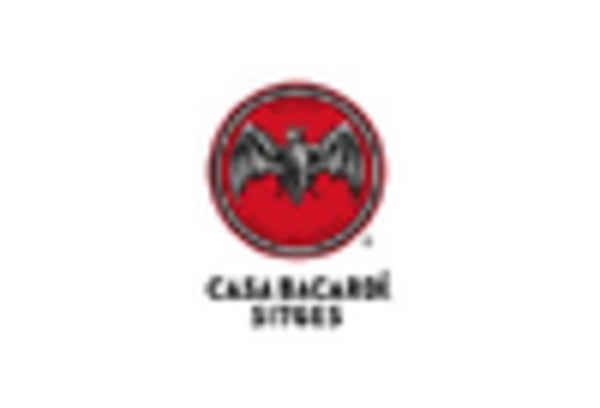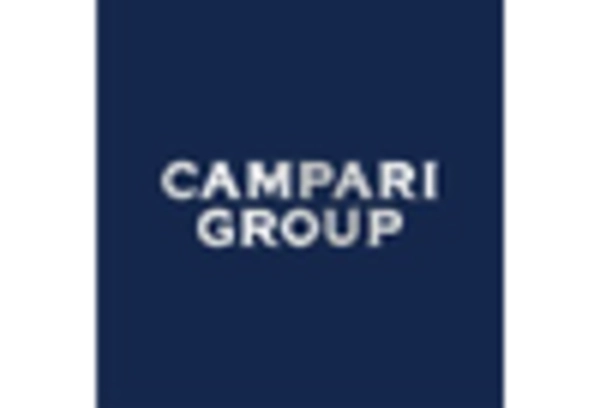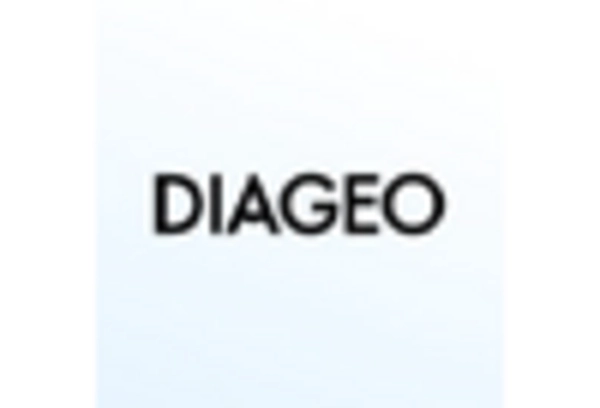Expansion of Distribution Channels
The flavored spirits market is witnessing an expansion of distribution channels, which plays a crucial role in enhancing product accessibility. Retailers are increasingly recognizing the potential of flavored spirits, leading to their inclusion in a wider range of outlets, from supermarkets to specialty liquor stores. Recent statistics indicate that online sales of flavored spirits have grown by approximately 25% in the last year, reflecting a shift in consumer purchasing behavior. This expansion is not limited to physical stores; e-commerce platforms are becoming vital for brands to reach consumers directly. The convenience of online shopping, coupled with the ability to offer exclusive flavors, is likely to drive further growth in the flavored spirits market. As distribution channels continue to diversify, brands can effectively tap into new consumer segments, thereby increasing their market share.
Growing Interest in Craft Distilling
The flavored spirits market is benefiting from a growing interest in craft distilling, which emphasizes quality and artisanal production methods. Consumers are increasingly drawn to small-batch distilleries that offer unique flavors and a personal touch. This trend is reflected in the market, where craft spirits account for a significant portion of sales, with estimates suggesting a growth rate of around 10% annually. The emphasis on local ingredients and traditional distillation techniques resonates with consumers seeking authenticity in their drinking experiences. As craft distilleries continue to emerge, they are likely to introduce innovative flavors that challenge conventional offerings, thereby enriching the flavored spirits market. This movement towards craft production not only enhances consumer choice but also fosters a deeper connection between brands and their customers.
Regulatory Changes and Market Adaptation
the flavored spirits market is navigating a landscape shaped by regulatory changes that impact production and distribution. Recent adjustments in legislation regarding alcohol content and labeling requirements have prompted brands to adapt their strategies. These changes may create challenges, but they also present opportunities for innovation within the flavored spirits market. For instance, brands are exploring new formulations to comply with regulations while still delivering appealing flavors. Additionally, the market is witnessing an increase in transparency, as consumers demand clearer information about ingredients and production processes. This shift towards compliance and transparency is likely to enhance consumer trust and loyalty, ultimately benefiting the flavored spirits market. As brands adapt to these regulatory changes, they may find new avenues for growth and differentiation.
Influence of Social Media and Influencers
The flavored spirits market is significantly influenced by social media platforms and the rise of influencers who promote unique drinking experiences. As consumers increasingly turn to social media for inspiration, brands are leveraging these platforms to showcase their products in creative ways. This trend has led to a rise in user-generated content, where consumers share their own cocktail creations, thereby enhancing brand visibility. Data suggests that brands engaging with influencers can see an increase in sales by up to 20%, as these endorsements resonate with younger demographics. The flavored spirits market is thus becoming more intertwined with digital marketing strategies, creating a vibrant community around cocktail culture. This social media-driven engagement not only boosts brand loyalty but also encourages experimentation among consumers, ultimately benefiting the flavored spirits market.
Rising Consumer Demand for Unique Flavors
The flavored spirits market is experiencing a notable surge in consumer demand for unique and innovative flavors. This trend is driven by a growing interest in craft cocktails and mixology, where consumers seek distinctive taste experiences. According to recent data, the flavored spirits segment has seen an increase of approximately 15% in sales over the past year, indicating a shift towards more adventurous drinking preferences. As consumers become more experimental, brands are responding by introducing a wider array of flavors, including exotic fruits, spices, and botanicals. This diversification not only caters to the evolving palate of consumers but also enhances the overall appeal of the flavored spirits market, making it a dynamic and competitive industry. The continuous introduction of new flavors is likely to attract a broader audience, further propelling market growth.

















